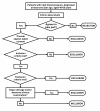EDUCORE project: a clinical trial, randomised by clusters, to assess the effect of a visual learning method on blood pressure control in the primary healthcare setting
- PMID: 20673325
- PMCID: PMC2920281
- DOI: 10.1186/1471-2458-10-449
EDUCORE project: a clinical trial, randomised by clusters, to assess the effect of a visual learning method on blood pressure control in the primary healthcare setting
Abstract
Background: High blood pressure (HBP) is a major risk factor for cardiovascular disease (CVD). European hypertension and cardiology societies as well as expert committees on CVD prevention recommend stratifying cardiovascular risk using the SCORE method, the modification of lifestyles to prevent CVD, and achieving good control over risk factors. The EDUCORE (Education and Coronary Risk Evaluation) project aims to determine whether the use of a cardiovascular risk visual learning method--the EDUCORE method--is more effective than normal clinical practice in improving the control of blood pressure within one year in patients with poorly controlled hypertension but no background of CVD;
Methods/design: This work describes a protocol for a clinical trial, randomised by clusters and involving 22 primary healthcare clinics, to test the effectiveness of the EDUCORE method. The number of patients required was 736, all between 40 and 65 years of age (n = 368 in the EDUCORE and control groups), all of whom had been diagnosed with HBP at least one year ago, and all of whom had poorly controlled hypertension (systolic blood pressure >or= 140 mmHg and/or diastolic >or= 90 mmHg). All personnel taking part were explained the trial and trained in its methodology. The EDUCORE method contemplates the visualisation of low risk SCORE scores using images embodying different stages of a high risk action, plus the receipt of a pamphlet explaining how to better maintain cardiac health. The main outcome variable was the control of blood pressure; secondary outcome variables included the SCORE score, therapeutic compliance, quality of life, and total cholesterol level. All outcome variables were measured at the beginning of the experimental period and again at 6 and 12 months. Information on sex, age, educational level, physical activity, body mass index, consumption of medications, change of treatment and blood analysis results was also recorded;
Discussion: The EDUCORE method could provide a simple, inexpensive means of improving blood pressure control, and perhaps other health problems, in the primary healthcare setting;
Trial registration: The trial was registered with ClinicalTrials.gov, number NCT01155973 [http://ClinicalTrials.gov].
References
-
- Kearney PM, Whelton M, Reynolds K, Muntner P, Whelton PK, He J. Global burden of hypertension: analysis of worldwide data. Lancet. 2005;365:217–223. - PubMed
-
- Banegas-Banegas J. Epidemiología de la hipertensión arterial en España. Situación actual y perspectivas. Hipertensión. 2005;22:353–362. doi: 10.1016/S0212-8241(05)71587-5. - DOI
Publication types
MeSH terms
Associated data
LinkOut - more resources
Full Text Sources
Medical
Miscellaneous


